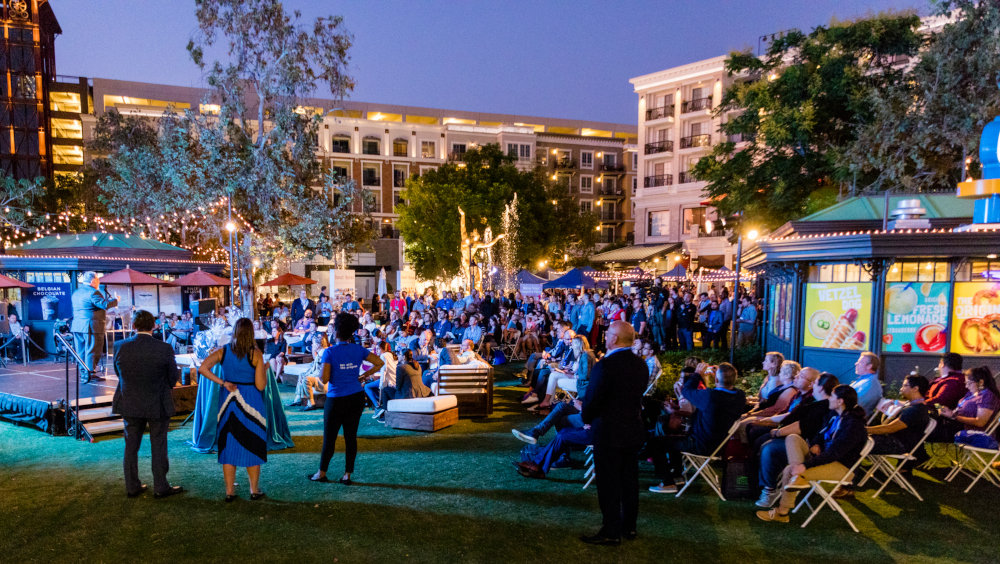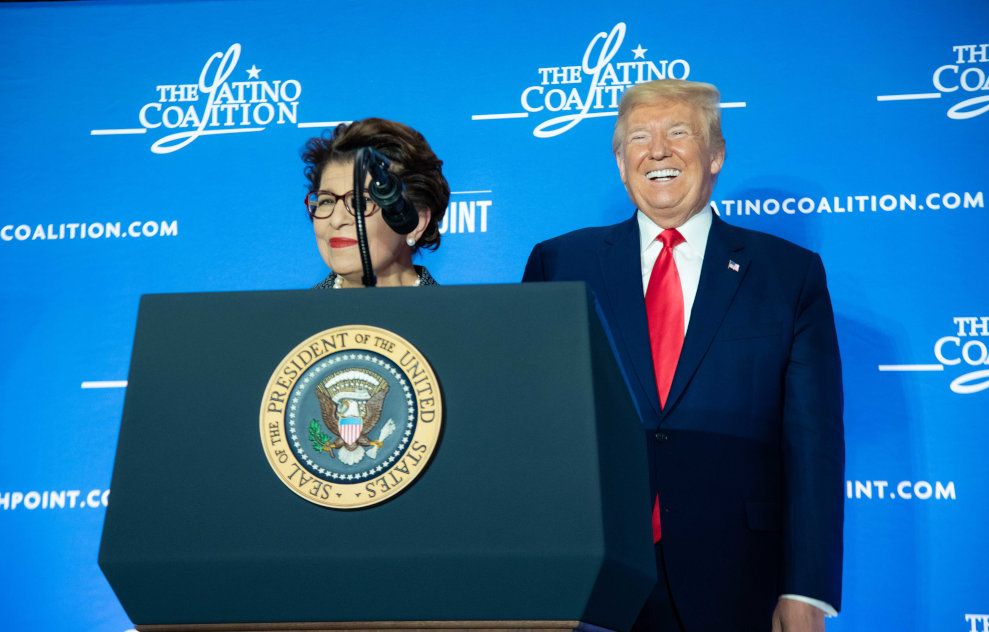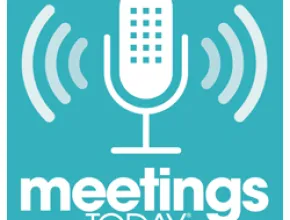Expert Tips on Transitioning From Live to Virtual Events
Thinking about launching virtual meetings as a standalone event option or augmentation to a live event?
Amanda Ma, founder and CEO of Innovate Marketing Group, dove into the virtual events pool headfirst after COVID-19 hit, and offers her expert tips on how to pull them off, from pre- and post-event preparation and follow-up to technical issues to look out for and how to put that little personal touch on them that the digital world often lacks.
Meetings Today’s Tyler Davidson spoke with Ma, who wrote “Case Study: 5 Pandemic Safety Tips for High-Level Summits” story in late March, about her secrets to virtual meetings success. Listen below.
Also available on iTunes, Google Play and Pocket Casts.



Rather read the transcript?
[Start Transcript]
Tyler Davidson: Hello, and welcome to this Meetings Today Podcast. Thanks for joining us today. We are joined today by Amanda Ma, the founder and CEO of Innovate Marketing Group, an award-winning event and experiential marketing agency based in Los Angeles, but operates all over the place. So thanks for joining us, Amanda.
Amanda Ma: Thank you so much, Tyler. I'm excited to talk to the audience today and share some insights.
Tyler: Actually, why don't we start with maybe just telling the audience a little bit more about what Innovate Marketing Group’s about?
Amanda: I love that. Innovate Marketing Group: We are a life experience agency that provides full-service events and activations for top brands. We love connecting and creating experiences for brands. Some of our clients include TikTok, City National Bank, East West Bank and Honda.

Photo: One of Innovate Marketing Group's live events was Glendale Tech Week (2019). Credit: Innovate Marketing Group
Tyler: Wow. Right. And, and of course, everyone out there listening knows—and I'm sure you're no exception—everything has kind of changed in the last couple months since the COVID-19 pandemic has struck. How has that affected your business and the events segment in general?
Amanda: You know, it's been very interesting. You know, I've been in the events industry for about 15 plus years, and this is, I would say, one of the most uncertain times that we're challenged with. However, as an entrepreneur—and as you know, an events person—we learn to pivot really fast. You just have to think fast on your feet, and that's what we do best. So we've been pivoting a lot of our clients either to virtual events or helping them adjust to what we call the new normal.
Tyler: And I think you refer to that as a pivot to digital. Why don't you explain a little bit more about what that concept means?
Amanda: Great. I think initially, a lot of people—you know, we don’t how long this will last. So I would actually say, for the first four weeks some of our corporate clients were still optimistic and thinking it may blow over after, you know, a month. As you can see right now, within California, originally, it was April 17. So actually it was tomorrow that we were supposed to be able to get back to work, and then they postponed it to the end of April, and now it's actually May 15.
So we have started, more and more, speaking with our corporate clients to be proactive and plan out the virtual scenario so that they can be active once their senior management checks in with them. What that means is bringing their events online, you know, and start looking at the different platforms that could be an ideal fit for their brand and what the type of event that they're trying to do as well. And for some of them, we help them with sponsorships.
So even today I just got asked, ‘Can you come up with some creative sponsorship ideas for us because we're sponsoring this big event, but now it's virtual? So how can our brand still stand out during this time as a sponsor?’
[Related: Case Study: 5 Pandemic Safety Tips for High-Level Summits]
Tyler: And I think having to weather this like everyone—I've basically been locked in my house for over a month now, with maybe a trip just to go get supplies every once in a while. But I think, you know, there's a risk of companies, organizations kind of going dark right now and not knowing what to do, and I think that's not a good strategy. You really have to be out there in front of your audience. So what are you telling your clients and what strategies are you implementing for them to really keep active in this time?
Amanda: Definitely—and I think you hit it on the spot—it’s definitely not time to go dark. Instead, it's time to go virtual, go digital, right? There's so many platforms out there. We need to leverage that, whether it's doing webinars, podcasts like this, so that your voice and your brand continue to stand out.
 And there are many ways you can leverage the platforms that are out there. Virtual events is actually very creative. And, you know, a lot of time with live events, we have capacity restraints versus for virtual events, you know—it could be up to a million people.
And there are many ways you can leverage the platforms that are out there. Virtual events is actually very creative. And, you know, a lot of time with live events, we have capacity restraints versus for virtual events, you know—it could be up to a million people.
Photo: Amanda Ma, the founder and CEO of Innovate Marketing Group.
Tyler: Yeah, that's interesting. And I know virtual events have been around for a while. And I think, you know, maybe 5, 10 years ago, people were even trying that maybe with limited success. And technology does march on and advance; how has that model sort of changed to fit in with today?
Amanda: Now being that is kind of the only option, right? We're all trapped at home; we can really do no gatherings of more than 10 people. So our events are smaller—the event is like 300 people. But what is really good—I see it as a blessing in disguise in that, you know, you're totally right—because five to 10 years ago, we were exploring the virtual event opportunity as well. But our client was still so focused on the live events.
But given the state of what's happening now, everybody's forced to look at virtual events as an option if they want to continue to thrive or survive even. And that’s where virtual events are actually really great.
So what we're talking about is beyond Zoom. Zoom is only one platform I know that a lot of people are using for virtual event. You know, the more sophisticated version, we can even do matrix, which is really great for a lot of brands, so hard data that people can use to monetize later, whether it does viewer retention. They can even track live viewing activity, page activity surveys, as well as contact information, which the brands can leverage into lead generation.
Tyler: Yeah, that's very important, because that has all sort of been lost in the last month or so. How does one pivot their event business to embark on this new direction?
Amanda: Sure. So at our agency we task our team to look for platforms out there that will work for our type of clients. So again, depending on the planners out there—it’s not one-size-fits-all; you have to look for the one that works for you. And at our agency we do big conferences, you know, holiday events, galas to sponsorship activations.
So that's why even for us, we were looking at different platforms, and talking to our vendors as well, a lot. We talked to our AV vendors, because they have pivoted, as well, to see what platform works best, keeping the communication open.
And then once you find the platform you really like and you want to extend to your client, just make sure you navigate it yourself and test things out before you even introduce it to your client. So you could kind of work out all the glitches beforehand.
[Related: Go LIVE Together Fights for the Live Events Industry]
Tyler: And I know people are sort of forced to deal in virtual events now, but are there any benefits to a virtual event maybe people have overlooked?
Amanda: There definitely are, actually. So if we think about when I'm looking at the overall event budget, so now without a venue site, that's usually our most expensive, and also food, right? So, usually that’s 30% of our entire event budget. I no longer need flowers or decor; I just need to make sure the website looks fantastic and spend money on a very good internet connection.
But, you know, we're estimating anywhere between 20% to 30% cost saving. And then for a lot of our corporate clients, we're always very cautious about making the event also a very sustainable event. And what's more sustainable than a virtual event?

Photo: One of Innovate Marketing Group's live events was The Latino Coalition Legislative Summit (2020). Credit: Innovate Marketing Group
Tyler: Right. And what are some things that people should really be aware of? Any sort of roadblocks or potential hazards if they go down this path of doing a virtual event?
Amanda: Internet connection is a big one. You know—testing that out, making sure you're not tapping into the same hardwired internet for numerous things on the day of, like whether it's a live event. You should have a separate internet connection for different things, especially the one you're featuring live, and make sure the bandwidth is strong enough. So that's always something we talk to our AV team about to make sure we provide what they need in terms of that bandwidth support.
Secondly, the content and then planning out your goal and purpose of doing this virtual event. Sometimes we get lost in the details, but take a step back, right? If today your goal is to, you know, communicate this important information to senior leadership, that's one goal.
If today you're trying to raise a million dollars for a walk, that's a different goal, right? And everything you're planning for that comes back to that goal and objective.
Lastly, just that everybody's on board. I think leveraging the team, leveraging the client and educating them how this works. Initially, we see resistance because it's a new platform they have to learn, but just making it really easy so that they find it easy to use, right?
And then, sorry, one more—security. You guys probably already heard about a bunch of Zoom bombing. So making sure that's something you talk to your provider about. Say, ‘Hey, what happens if this happens? It actually happened to someone I know. They were doing a prayer, and then they got Zoom bombed. You know, even within our internal agency, we implemented ways to ensure that we don't get Zoom bombing as well.
Yeah. And, you know, honestly, it comes back to practicing, so we're actually doing a virtual event this week, you know, so I would talk to my team, like, have you guys practice? Did you guys practice with a client? Just like how we do a dry run for a live event, we definitely make sure we do a dry run, except now we're doing it like two or three times to work out all the glitches because it is something new for the client. So we just want to make sure we test it out so it's more seamless when we actually do go live.
[Related Webinar: Best Practices to Accelerate Your Pivot to Virtual Events]
Tyler: And I'm guessing, too, there's different sorts of pre and post strategies to incorporate on a virtual event rather than a live event?
Amanda: Yeah. So I would say pre or post with the normal live event, we would normally send out an invitation, and then for a live event we probably will have a swag bag for everybody. But now those could be pre-arranged, so you would arrange the swag bag to arrive at their house before the event. Or there is actually a great candy service that's online that we use at our agency that’s called Sugarwish—and I'm not endorsing them in any way; I don't get money for endorsing them—but they're a great platform. So you actually could send it out to all the attendees just using their email, and people could pick out the candy they like, and then a few weeks later, they get that candy box in their mail.
Tyler: Oh, that's a nice little touch. It's the personal touch, I guess you miss in the virtual world so many times, right?
Amanda: Yes, yes. People who are our clients were asking us, well, we’re going to do this event, so how can we thank them for coming or thank the speaker? I say you could still do it, you know. So this is one of the examples. Actually, I talked to them today about sending something like this to them and they don't have to pick out their own candy. You could have it pre-branded and pre-selected and send it to them, but I noticed people really enjoy hand selecting the candy, because not everybody likes chocolate, right? Not everybody loves sour gummies.
Tyler: Yeah, that's a good point. And then kind of speaking to, you know, the folks that are in your world—what are some marketing and PR strategies that they should incorporate and leverage during this time right now?
Amanda: Great question. In terms of marketing, I would say, definitely, your website needs to be stronger than ever. So now you actually have time—because, you know, business probably is not as busy as usual—to make sure to boost up your website. Do a newsletter because everybody's home. So if they're not on a webinar or a podcast, they're probably reading their email.
Promoting your content on social media is another great one. What we're doing at our agency is, over the years we have collected all these amazing testimonials, but now we're putting it as a series together and we'll be sending out a campaign based on that.
Doing work on your sizzle reel; like little mini-clip versions—15 to 30 seconds—of your events, or of different messaging that you want to push out. Those are great way to engage your audience.
Tyler: And yeah, I think Just make sure you're doing something, you know—don't stop. And then there's a great website out there called Help a Reporter. For those of you that don't know, it’s a great resource. Basically, put yourself out there as a resource. So this particular website is all media, a lot of the media outlets looking for insights for Mexico, you know. They need their, like, I need to talk to someone who owns a small business or who owns a business or who owns an events business, right? And then you could be the source, and then at the same time that will give you and your company publicity.
Tyler: Maybe in a general sense, it also speaks to the strategy of, you know, there's a lot of people right now that are kind of frozen at the switch and don't know what to do. So if you're really out there and active, you have a good chance of maybe seizing some market share during a time like this.
[Related: Key Considerations for Planning a Virtual Association Meeting]
Amanda: Yes, it’s really smart. I would say if you're not already media-ready, get media-ready. And what I mean by that is make sure you have a direct media contact.
So on our agency’s website, you'll see a direct media contact. So it doesn't just say ‘info at Innovatemarketing.com.’ We actually have a dedicated media contact, because a lot of times when media reach out, they want an answer right away. Yeah, give me your bio, get your headshot ready. Your bio; make sure you have a short version and a long version. Your headshot should be high resolution if you don't want to be blurry, and find one that's professional. And then some key questions or sample questions about where your expertise lies so that you’re prepared like, ‘This is what I'm good at. This is what I can share, or offer insight. Yeah, and then the last one I will mention, just respond to them quickly, because they oftentimes have a tight deadline.
Tyler: And I have to say that I can vouch for that, especially with you and in your agency, because we've already worked on a couple things and got some great stories out, and you've been very proactive in getting back. So you live the tips you're giving. I just got to throw that out there.
Amanda: Thank you so much. I'm glad. I'm glad we are.
Tyler: And then we're getting ready to sort of wrap this up. But you know, one thing that I've been asking a lot of people is that, yeah, we're in the new normal right now. And, you know, eventually this is going to subside. What things do you think have sort of changed forever out there and what strategies that are being incorporated now will maybe outlive this crisis we're in?
Amanda: You know, I know live events are so crucial and so impactful, it will never go away, right? And I'm looking with my arms wide open waiting for it to come back. What I know is that the virtual events—because now people are going to get a taste of it—so that's even more out there in the future. You know, so maybe this big gala you're doing or big conference is one ticket price. Going forward, now they're going to have a virtual version or virtual ticket sold for that. Because not everybody can make it and they realize that's a different audience they could also be exposed to and tap into, and that there's no limitation, right? You could be in Brazil watching the same conference as we are in Los Angeles.
Tyler: I think it used to be like a concept, and now it's moved to a reality. And I just think, also, that everyone's been sort of forced to learn these platforms like Zoom and participate in them. And now, once we come out of this, people are going to be very familiar and comfortable with them.
Amanda: Yes, I mean, I just did a virtual team building yesterday. You know, we're in the business of live events, but now we're even taking virtual team building online. But it was really fun. I have to say, I had my doubts in the beginning, but I had a blast.
Tyler: Well, excellent. Well, thank you for joining us today. Amanda.
Amanda: Thank you for having me on your show.
Tyler: You're quite welcome. And that was Amanda Ma, founder and CEO of Innovate Marketing Group. Thanks to her for joining us. And thanks to all of you out there for joining us for this Meetings Today Podcast. Head on over to Meetings Today; we have a wealth of podcasts with thought leaders in the industry, talking both about the crisis we're in right now—the COVID-19 crisis—and all sorts of other tips and strategies and general information about the meetings, events and incentives industry. So thanks for joining us, and go out and make it a great rest of the day.
[End transcription]
Read next: How Live Event Entertainers Are Going Virtual





